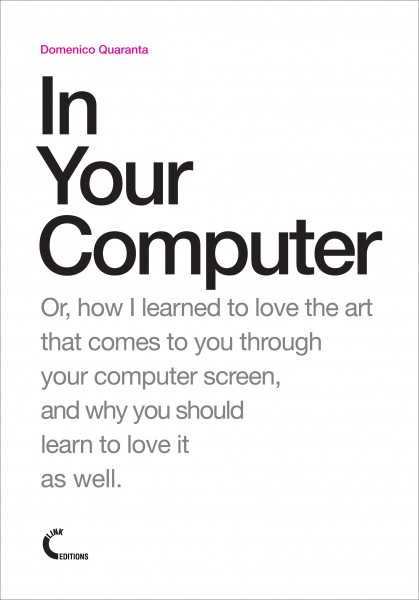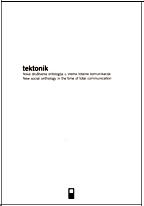Domenico Quaranta: In Your Computer (2011)
Filed under book | Tags: · art, biotechnology, curating, internet, interview, media art, media theory, net art, new media, software art, technology, video games

This book is a collection of texts written by Domenico Quaranta between 2005 and 2010 for exhibition catalogues, printed magazines and online reviews: a pocket version of what the author would save from the universal flood, in a world without computers. It documents most of the fields of research he has focused on critically: from Net Art to Software Art and videogames, from biotechnologies to the debate around curating and the positioning of New Media Art in the contemporary landscape, and back to Net Art again.
This itinerary is traced through a selection of essays, monographic texts and interviews with artists and curators, in no particular order: from Eva and Franco Mattes to Casey Reas, from UBERMORGEN.COM to Oliver Laric, from Cory Arcangel to Tale of Tales, from Jon Ippolito to Gazira Babeli.
As the author writes in the introduction: «We are in the midst of a major change. At the end of the process, not only the way we live, work, travel and communicate, but also the political and economical structures and the social organization we are used to will probably be fundamentally different from how they are now. In art, this change will be complete when the way we make, circulate and understand art is completely different from the way we do it now; and when the way we understand the difference between copies and original and between art and non-art will have adapted to the new models created by the information age. The most we can do now is to take our time, adapt to our new living conditions, be aware of the process going on and look to the most radical propositions around for signals of what is to come. In the awareness that we probably don’t have to look that far: these signals are already here, in our computers.»
Translation and editing: Anna Rosemary Carruthers
Publisher: LINK Editions, Brescia 2011.
ISBN: 978-1-4467-6021-5
180 pages
Licensed under the Creative Commons Attribution-NonCommercial-ShareAlike 3.0 Unported License.
publisher
lulu.com
via Domenico Quaranta
kuda.org (eds.): tektonik: New Social Onthology in the Time of Total Communication (2004) [English/Serbian]
Filed under book | Tags: · biotechnology, commons, control society, genetics, globalisation, internet, networks, technology

“tektonik is a collection of texts, transcripts of lectures and interviews with researchers, theoreticians, artists and activists who have been guests of the kuda.lounge program between 2001 and 2004 at the kuda.org New Media Center. The selected texts, lectures and interviews in this edition are a kind of research intersection in the domain of new technologies, culture and society, research of phenomena such as globalization, technological systems of control, mass communication and the Internet, new social movements, the new proletariat and new economy, the problem of intellectual property rights, and biotechnology. Given that society at the beginning of the twenty-first century is a media-saturated global society, particular focus has been directed towards the problem of the mediation of information which creates current reality.
From the very outset kuda.lounge has been a platform for discussion, argumentation and dialog, in the framework of which more than fifty presentations, lectures and workshops have been organized. In inviting key names involved in critical thinking and social theory and practice, kuda.org has attempted to offer the local public an insight into contemporary social questions in the world and to establish frequent and lasting communication and cooperation between local theoriticians and activists and an international network. At kuda.org the public has had the opportunity to hear lectures from Saskie Sassen, Steve Kurtz, Geert Lovink, Konrad Becker, Cindy Cohn and many others.
The development of information and communication technologies has introduced a new social ontology which has manifested itself on the political, cultural, economic and psychological plane. In a time when the promises of a techno-utopia are being transformed into highly-operationalized intelligent machines which serve economic interests, or into trainee virtual units for future conflicts (parallel education and training via computer games as combat simulation, unmanned flying craft – predators), the question is, to what extent can new technologies be used to fulfill some of the promises, pressing in the eighties and early nineties, in the prime of the so-called California ideology? Those promises included social prosperity, creative work, the creation of new workplaces, shortened working hours, global peace in an era of global enlightenment enabled by technology.
Via the texts in this collection we come face to face with warning projections of a dehumanized future determined by the interests of capital, a telling critique of technical-science as the ultimate generator of the capitalist machine. In opposition to this, we can see models of how the potential of new information and communication technologies can be used for democratization and realization of the project of a “better society”.
During the nineties the Balkans was a real battlefield where these global theories “fell in the water” and intersected with specific local interests. A particular idiosyncracy of the local context in the countries of the former Yugoslavia was the comprising of socialism as an idea, the direct or indirect threat of war, life in authoritarian centralism or in a neo-liberal framework of roughshod transition, which also precipitated distrust in broader social action. Parallel with the wars of the nineties, in Serbia a model of accelerated privatization of the public space and an ‘accelerated end’ of the industrial society was carried out, after which Serbian society found itself in limbo between its industrial past and an information-based future, waiting for the reopening of factories that would never be reopened.
The goal of the lectures and discussions was to critically analyze certain socio-political phenomena, to point to the root of the problem and present this to a wider public. The kuda.org center opens the possibility and space of different interpretations and models of the past, present and future social context, mapping those processes which could potentially endanger human freedom using the sophisticated methods of a high-tech society in a time of the knowledge economy. With the publication of this collection we conclude a cycle which has integrated subjects detecting general social problems, and in a “classical” print medium present them to a wider public.”
Contributions by Saskia Sassen, Micz Flor, Geert Lovink, Konrad Becker, Steve Kurtz, Kristian Lukic, Relja Drazic, Raqs Media Collective.
Serbian title: tektonik: Nova društvena ontologija u vreme totalne komunikacije
Publisher Futura publikacije, Novi Sad, 2004
kuda.read series, 001
Creative Commons Attribution-NonCommercial-ShareAlike 1.0 License
ISBN 8671880265
150 pages
PDF, PDF (updated on 2018-6-17)
Comment (0)Janet Hope: Biobazaar. The Open Source Revolution and Biotechnology (2008)
Filed under book | Tags: · biotechnology, copyleft, floss, intellectual property, open source, software, technology

Fighting disease, combating hunger, preserving the balance of life on Earth: the future of biotechnological innovation may well be the future of our planet itself. And yet the vexed state of intellectual property law–a proliferation of ever more complex rights governing research and development–is complicating this future. At a similar point in the development of information technology, “open source” software revolutionized the field, simultaneously encouraging innovation and transforming markets. The question that Janet Hope explores in Biobazaar is: can the open source approach do for biotechnology what it has done for information technology? Her book is the first sustained and systematic inquiry into the application of open source principles to the life sciences.
The appeal of the open source approach–famously likened to a “bazaar,” in contrast to the more traditional “cathedral” style of technology development–lies in its safeguarding of community access to proprietary tools without discouraging valuable commercial participation. Traversing disciplinary boundaries, Hope presents a careful analysis of intellectual property-related challenges confronting the biotechnology industry and then paints a detailed picture of “open source biotechnology” as a possible solution. With insights drawn from interviews with Nobel Prize-winning scientists and leaders of the free and open source software movement–as well as company executives, international policymakers, licensing experts, and industry analysts–her book suggests that open source biotechnology is both desirable and broadly feasible–and, in many ways, merely awaiting its moment.
Publisher Harvard University Press, 2008
ISBN 0674026357, 9780674026353
428 pages

